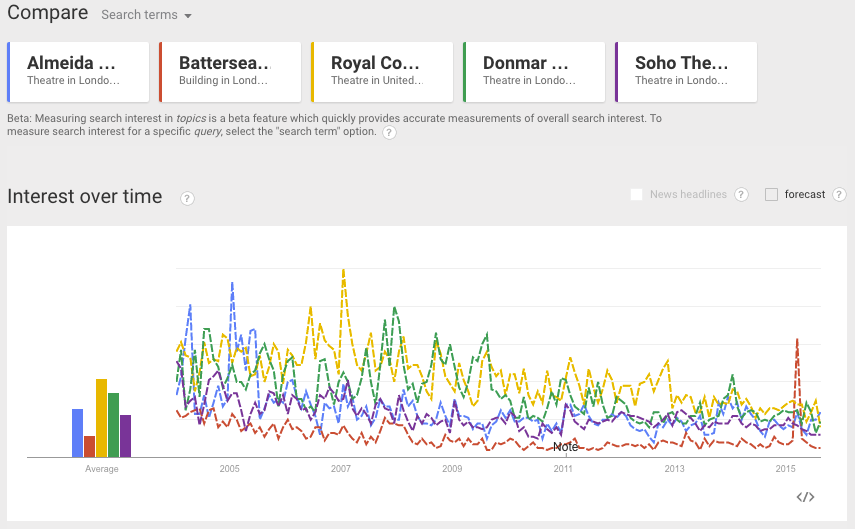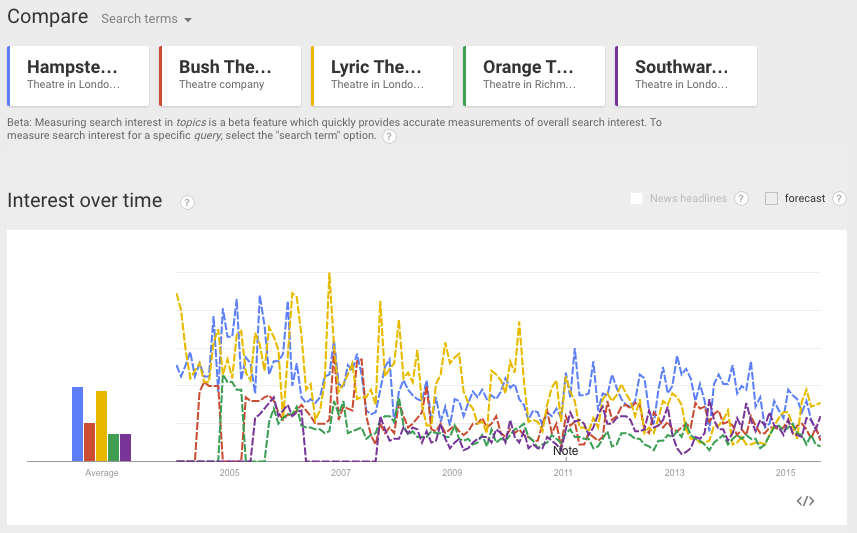I’m just throwing this here as it came up when I was looking at something else.
Here are the Google Trends results for a handful of off-West End theatres.

I can tell what a couple of the recent spikes are. The recent BAC (red) one will have been the fire. The Donmar (green) one must’ve been Tom Hiddlestone in Coriolanus.
Here are some others.

It’s slightly less pronounced with this lot. Interesting to note that Edward Hall took over at Hampstead in 2011 and seemed to inject new life into the place. That seems to show in the graph.
Put Hampstead’s performance in context with the Young Vic though. Woah!

So it’s not all bad, but overall the trend is generally downward, and at a rate that seems to match the trend for searches of the word ‘theatre’.
I’ve no conclusions to end on. Sorry about that. Although if you wanted evidence that traffic to event-focussed websites is going to be massively affected/determined by artistic programming decisions, then this points in that direction. Not that that should be any surprise.
Are there any other observations or conclusions that could be drawn from this?
UPDATE
A fair point here:
@ChrisUnitt Google Trends has a 'decay rate' for many English words- so the question is, are theatres decaying more than other institutions.
— -.– — ..- / … — . .-.. .-.. (@DrStu2012) August 19, 2015
The thing about Google Trends is it’s not exactly clear how amazing the data is (especially because I’m using topics, rather than straight search terms) and it’s entirely possible there’s some sort of decay rate, or inconsistency or something so really don’t go betting the house on the data above. Like-for-like comparisons are probably fair enough though. Probably.

Wonder what the Barbican’s graph would look like when it announced THAT Hamlet with a certain well-known actor? Off the charts, I suspect.
On another note, I wonder whether looking at the sort of data alone says anything really? I’ve been doing A LOT of reading of research lately, and the SOLT London Theatre Report shows very clearly that attendance and box office takings for London theatre are on the up and have been so over the same 10 years as your graph above for the search term ‘theatre’ uses. Putting together these two bits of data, a decline in search interest does therefore not equal a decline in physical audiences. So what does it show? Perhaps that people are getting their info from sources other than search engines now? Where? Social media? Hmmm. *Ponders*.
Re the Barbican – I bet there’ll be a bump, but I reckon the venue won’t be the focus of the search queries for that one, so maybe it won’t be that huge (would love to see their web stats though).
And yeah, this is really only useful (to some extent, maybe) for guaging brand recognition around the venues’ names. I’m not sure how Google Trends’ topic grouping works, but I’d be surprised if it wrapped up searches for productions, actors and more generic terms. So it won’t be the whole picture and shouldn’t really correlate with search traffic as a whole.
So yeah, a decline in *branded* search queries doesn’t correlate to a decline in physical audiences. Is that a useful insight? I think you’re right – probably not on it’s own.
It’s just occurred that the decline could also be down to things like auto-complete in search – if I start typing Almeida then Chrome will give me the URL to go to. Does that count as a search query? It doesn’t as far as Google Analytics is concerned.
That’s a good point – cookies also help avoid you having to search for your most frequently viewed sites. But then again, if you visit regularly, would you need to continue searching for it anyway? So it it a natural word decline as we convert more people into recurring visitors?
And one more thought – if you were searching for something to go and see at the theatre, you probably wouldn’t just type ‘theatre’, you’d put ‘theatre in London’ or some such other sentence-based search (I’m sure there’s a technical term for that!) which are being more prevalent (or are in our site). Would Google Trends recognise that?